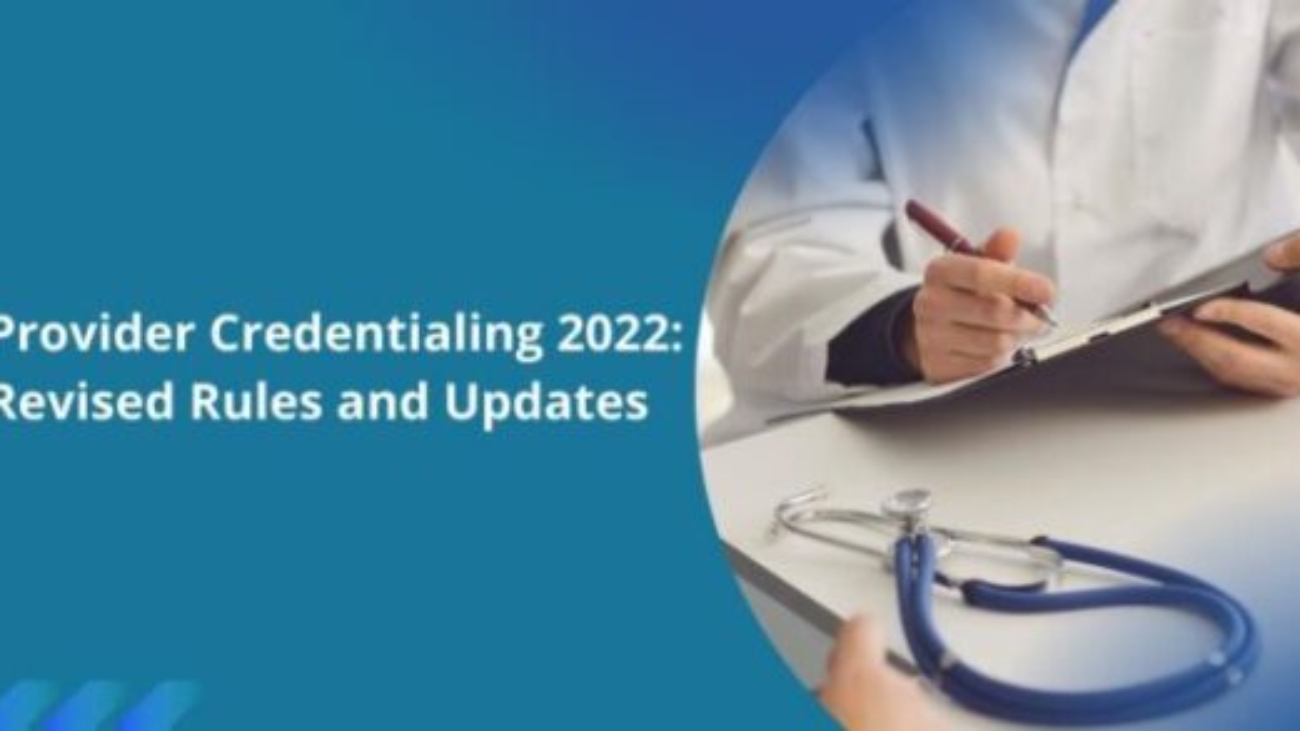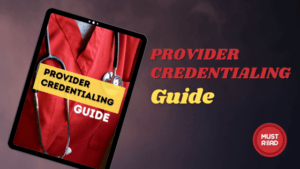Provider credentialing is one of the most crucial administrative processes in the healthcare ecosystem and forms a strong pillar of revenue cycle management in the organization. Though divided into a series of complex steps, healthcare organizations need to ensure that the provider credentialing process is accurate and complete to keep the revenue cycle up and running. Most healthcare organizations assign domain professionals to handle the methods to keep the documentation free from errors. However, provider credentialing rules keep evolving with each passing year. The credentialing staff must stay on top of the existing regulations and be updated on the latest changes.
Provider credentialing procedures vary for different payer networks. While some follow a similar framework as the Federal government, some might have a few specific requirements that you need to fulfill. As a provider credentialing specialist, you should stay adept at the latest changes coming your way in 2022. This blog will take you through the basics of provider credentialing as a starter and the changes introduced by Medicare for the year 2022.
List of Documents
There is no specific list of documents you need to prepare for the provider credentialing process. Government and private insurance payer networks have different requirements for their particular procedures. However, a few documents are fundamental to the provider credentialing procedure. Make sure you add the documents to your application accurately.
- Name and demographic details of the provider
- Complete curriculum vitae of the provider
- Proof of educational qualification including diploma certificates
- Proof of professional training course, if any.
- Detailed work history with required proof
- Valid medical license in the state of the application
- Professional liability insurance
- NPDB and HIPDB results with copies of certificates
- DEA certificate
- NPI Details
- CDS certificate, if any
- Board certifications and accreditations, if any.
- Documents on any disciplinary action in case the provider has faced any charges against them concerning previous medical practice.
- Clinical Laboratory Information Act (CLIA) certificate, if required for the specialty.
As mentioned before, this is not an exhaustive list. The payer networks might ask for additional documents to further your provider credentialing process. In some cases, the provider can supplement the documents beforehand to improve their case. For example, in case of any pending charges for malpractice, the doctors could submit documents supporting their side. They can also include transcripts from the court ruling in their favor.
Medicare Provider Credentialing Updates
According to the statistical figures released for 2022, about 63 million people in the United States of America are enrolled in the Medicare program offered by the Centers for Medicare and Medicaid Services. With the increasing number of enrollees in the federal health program, getting credentialed with Medicare is an excellent opportunity for the provider to serve more patients. The CMS uses the Medicare Provider Enrollment Chain and Ownership System (PECOS) system to enroll the providers into the provider credentialing process.
The Medicare program had changed some of its rules during the onset of the global pandemic in 2020. Experts find that Medicare has shown two trends in setting their provider credentialing workflow. One of the trends shows Medicare expediting the provider applications to allow more healthcare workers to be on the field and help manage the health emergency. They have also allowed temporary provider enrolments to handle the situation. In some other cases, Medicare has slowed down the application procedures and suspended the revalidation workflows in order to dedicate more staff to manage the pandemic than documentation.
- In 2022, Medicare has reinstated the revalidation procedures as was done before the pandemic started.
- Medicare has sent out letters for the same to the providers at least three months in advance of their deadlines to meet the revalidation requirements.
- Providers who fail to submit their revalidation documents within the deadline will be penalized for their absence. Medicare billing advantages will be suspended for them, and Medicare will reimburse no service rendered during this period.
- The temporary enrollees have been exempted from this system as of now, keeping in mind that the Public Health Emergency is still in place.
- However, the CMS has also announced that once the PHE is officially lifted, the temporarily enrolled providers would have to go through the entire process of getting credentialed under Medicare.
- The application fees of $631 for 2022 required for the Medicare enrollment program have also been reinstated. Institutional providers, DMEPOS suppliers, and Opioid Treatment Programs (OTP) vendors were exempted from submitting application fees during the public health emergency period.
- The temporarily enrolled providers need not pay any fee as of now. However, they will have to pay the required amount once they apply for a permanent Medicare enrollment program.
- Doctors, non-physician practitioners, provider organizations, and non-physician institutes do not need to pay any application fee, as was done before.
- According to the new rules effective from January 1, 2022, Medicare Diabetes Prevention Program (MDPP) suppliers do not need to pay any application fee during the Medicare enrollment procedure.
Provider Credentialing Services
Provider credentialing involves a series of complex steps to get accurately completed. Industry leaders believe that you must keep 3 to 6 months aside for the application to get accepted by the insurance payer networks. Collecting various documentation, filling the lengthy application forms, and following up with the insurance companies can be challenging for a provider with a busy schedule. Also, any manual error while handling the documents could lead to an unnecessary delay for credentialing confirmation.
Staying updated with the latest federal and state regulations modifications can become pretty hectic for the in-house teams. Get in touch with the leading provider credentialing services and outsource the work. The experienced professionals with domain expertise and dedicated tools will ensure that your provider credentialing procedure is completed without unaccounted delays. Make sure the partnering companies have experience working with different payer networks and know-how to navigate their way through this process.
We hope this article helped you understand the Medicare provider credentialing updates for 2022. Please connect with us in the comment section below in case of any queries. Subscribe to our blog for regular articles on the medical billing industry. Follow us on Facebook, Instagram, Twitter, and LinkedIn for more.




